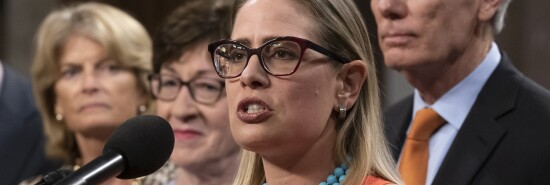
Sinema’s party switch has major presidential implications
Quin Hillyer
Tea leaves, Tarot cards, and crystal balls all agree: Arizona Sen. Kyrsten Sinema’s Friday re-registration from Democratic to independent will reverberate in the 2024 presidential race.
Sinema’s move could be an ominous one for the two-party-dominant system. Not since Ross Perot’s candidacies in 1992 and (to a lesser extent) 1996 has there been a greater potential for a non-Republican, non-Democratic candidate to contend seriously for the presidency. (And yes, Perot had a real chance to win in 1992 before he started behaving like a loon.) Especially with a doddering and incompetent Joe Biden apparently gearing up for a Democratic reelection bid and with Donald Trump likely to try torpedoing Republican chances if he is not that party’s nominee again, the public clamor for an alternative to both should be substantial.
KYRSTEN SINEMA LEAVING DEMOCRATIC PARTY TO REGISTER AS INDEPENDENT
Gallup reports that more people now self-identify as independents than as either Republicans or Democrats. So far, those independents have lacked an electoral vehicle to effectuate their rejection of both parties. Increasingly, though, anyone with a decent political antenna can discern a growing restlessness among them to turn their independence into action.
Meanwhile, a new party whose most prominent member is the decidedly left-leaning but fresh-thinking entrepreneur Andrew Yang, the Forward Party, has worked hard to create at least a patina of cross-ideological unity. It includes former Republicans such as New Jersey Gov. Christine Todd Whitman and strategist Joel Searby.
Moreover, an unusual number of prominent politicians have expressed dissatisfaction with the two-party straitjacket and might conceivably choose an independent or alternative party route in future contests. Among them are not only the liberal Sinema (lifetime American Conservative Union rating just 14.74), the liberal-leaning Sen. Joe Manchin of West Virginia (ACU: 27.48), and the decidedly conservative Rep. Liz Cheney (ACU: 76.64), but also liberal ex-Democrat and former Rep. Tulsi Gabbard (ACU just 7.61), centrist Republicans Rep. Adam Kinzinger (56.68) and former Rep. Will Hurd (64.40), restless Republican Govs. Larry Hogan of Maryland, Chris Sununu of New Hampshire, and Phil Scott of Vermont, and Republican Sens. Lisa Murkowski of Alaska and Susan Collins of Maine. Except for those last three, they all are thought to harbor at least a modicum of presidential (or vice presidential) ambitions.
From a Senate reelection standpoint for 2024, Sinema’s move to independent status makes little sense. Democrats are unlikely to give her a free ride by not choosing a strong nominee of their own, and Republicans will salivate over the center Left and the far Left dividing half the vote while the GOP nominee skates into office. Instead, unless Sinema plans to exit politics altogether, her move almost certainly indicates some presidential plans, either via the Forward Party or some other, non-major-party option. And while there’s almost no way for her to join a ticket with someone as conservative as, say, Cheney, one could see a combination of her with Hurd, Hogan, or Kinzinger.
I’ve argued earlier that while a major third party would have a hard time actually breaking through to victory, a four- or five-party contest could well create a winner who isn’t on either the Republican or Democratic tickets. And, just as was the case in 2015 a month before Trump rode down the escalator to pretend to care about people who felt voiceless, the public hunger remains for candidates less interested in toeing party lines than in showing they “care about people like me.”
Count this column not as advocacy (it definitely isn’t), but as a well-considered prediction that a third- (and perhaps fourth-) candidate effort will have a large part in determining the winner of the presidency in 2024. Sinema’s re-registration is the first step in that process.
CLICK HERE TO READ MORE FROM THE WASHINGTON EXAMINER
